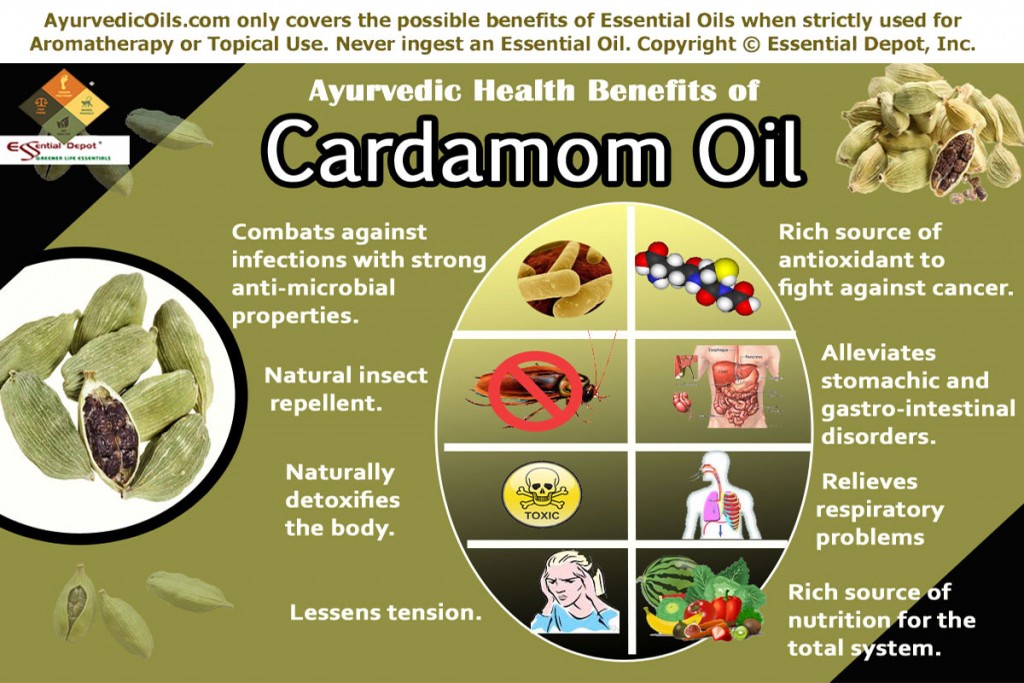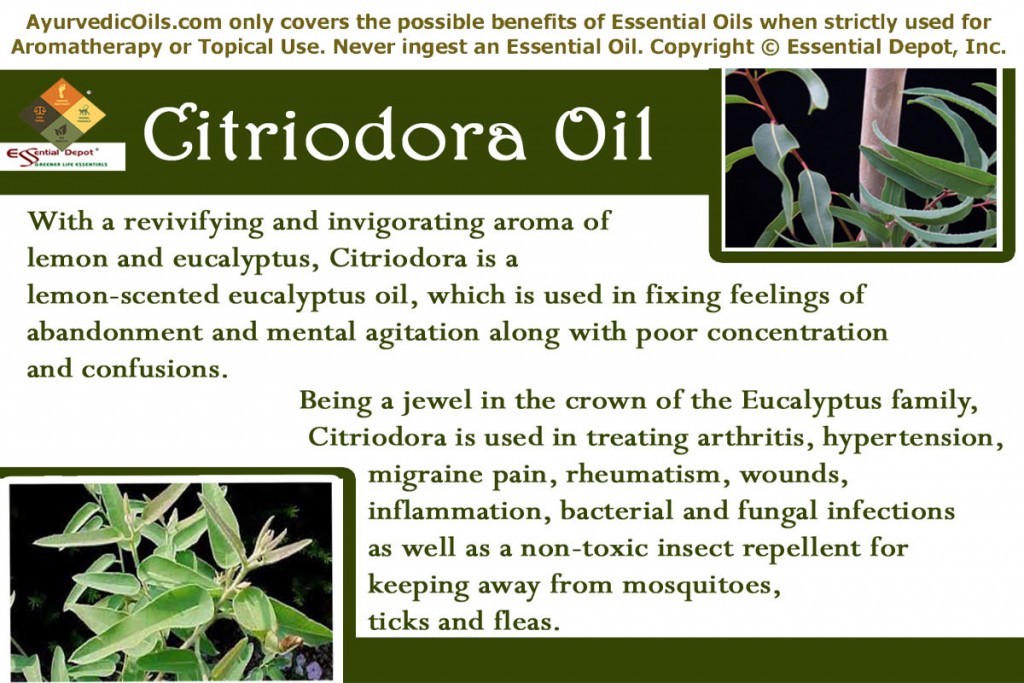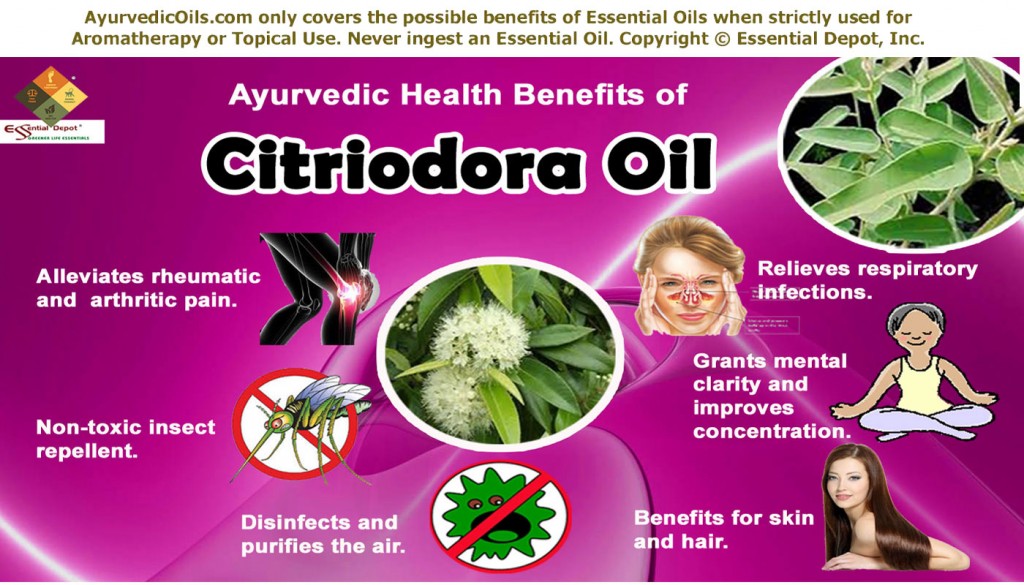Cardamom, the ‘Queen of spices’, stimulates the heart and mind and brings in enormous joy and clarity of thoughts. It has been in imperial use since the primordial times for its mammoth healing benefits that serve as a phenomenal tonic, expectorant, cephalic, antispasmodic, stimulant and as a promising digestive agent.
 Botanically named as Elettaria Cardamomum, Cardamom is well identified by its small seed pods with an outer shell enclosing the small black seeds from which its essential oil is extracted by steam distillation.
Botanically named as Elettaria Cardamomum, Cardamom is well identified by its small seed pods with an outer shell enclosing the small black seeds from which its essential oil is extracted by steam distillation.
Lovingly called as Ela and Truti in Sanskrit, Cardamom has been widely used in Ayurveda for its aromatic and medicinal attributes in the treatment of impotence, bronchitis, indigestion, hoarse voice, vomiting, asthma, blood pressure, poor absorption, cold, cough, bad breath, loss of taste, nervous digestive upset and mood fluctuations.
As an invigorating agent for the central nervous system, Cardamom essential oil induces a sense of harmony and supports absolute fitness.
Purchase Cardamom Essential Oil – Wholesale – CLICK HERE
Historical uses and importance of Cardamom and its essential oil:
Owing its origin to the Asian countries such as India, Bhutan, Nepal and Pakistan, Cardamom is a universal spice and is a member of the powerful Ginger family, Zingiberaceae. Rich in nutritional and healing properties, Cardamomis the third most expensive spice in the world standing next to saffron and vanilla.
It is crowned as a medicinal herb in the Indian Ayurvedic healing methodology, dating back to 4th century B.C; Cardamom has carved its name in Charaka Samhita – the Ayurvedic encyclopedia, for its application in the preparation of various medicaments.
Cardamom was an important part of the Roman and Greek trade and has numerous historical accolades. Believed to have been grown in the hanging gardens of Babylon, Cardamom has been mentioned in the works of Dioscorides, Theophrastus and even in the ancient Indian sacred books known as Vedas.
Arabic medicine portrays Cardamom seeds as the best aphrodisiac and mood elevator while the Chinese medicine predominantly used Cardamom for intestinal infections, stomachic problems, gastrointestinal disorders, constipation and dysentery.
In folklore medicine, digestive disorders were treated with a herbal drink made by boiling roasted Cardamom seeds along with betel nuts. Being an active ingredient in cough drops, Cardamom was administered nasally along with camphor and neem to treat cold. It is a natural mouth freshener.
Cardamom is an antidote to caffeine and it detoxifies the caffeine in coffee and is used in making tea to relieve the symptoms of headache and stress and these seeds were taken along with honey to improve the eyesight.
The traditional Indians used Cardamom as an antidote for poisonous bites like scorpion stings and venomous snake bites. These seeds and its oil were also used for treating respiratory ailments, gastrointestinal disorders, inflammation of the eyelids and oral infections.
Being transported from East to Europe, Cardamom was highly valued as a tonic and as an aphrodisiac agent, which was used in love potions. The western world uses Cardamom for its unique aroma and sedative properties.
Chemical constituents and therapeutic properties of Cardamom essential oil:
Consisting a majority of monoterpenes with the predominant one being 1, 8-cineole, Cardamom essential oil also comprises of esters, alcohols and sesquiterpenes that includes limonene oxide, α-terpinene, neryl acetate, formic acid, α-pinene, camphene, caryophyllene oxide, nerolidol, β-pinene, sabinene, citronellal, α-terpineol, cis-ocimene, geranyl acetate, linalool, isomenthol, 4-terpineol, nerol, thymol, α-terpinyl acetate, α-guaiene, β-myrcene.
The therapeutic properties of Cardamom essential oil are carminative, digestive, antiseptic, stimulant, tonic, antispasmodic, cephalic, diuretic, stomachic, analgesic, expectorant, antifungal, astringent, antibacterial, aromatic, diaphoretic, antioxidant, cooling, anti-platelet aggregation, anti-hypertensive and aphrodisiac.
Ayurvedic health benefits of Cardamom essential oil:
Ayurveda is a virtuous medical discipline that believes that every being on earth is a part of Mother Nature and it states that one’s wellness indicates absolute balance with nature and sickness symbolizes imbalance with nature. Ayurveda is a 5,000 year old healing system that has its medicinal practices recorded in Atharvana Veda, one among the 4 sacred books of India, where about 114 verses in this book talk about various illnesses and their Ayurvedic remedies.
Charaka, the father of medicine and Sushruta, the father of surgery were the most famous Ayurvedic physicians and they wrote the Ayurvedic texts namely Charaka Samhita and Sushruta Samhita. Charaka says “The three – body, psyche, and soul – act as a tripod. The world stands upon them, and within them, the world abides.” According to Ayurveda, human body is a temple where the spirit lives in. It strongly recommends on keeping the body, mind and spirit pure and tranquil just like maintaining a place of worship.
Ayurveda is called as the mother of all the other healing sciences on earth and is a holistic system that states ‘perfect health is being fit physically, mentally, emotionally and spiritually.’
Every individual is approached in a unique manner even if they are affected by the same illness because Ayurvedic philosophy recognizes every human being as a distinct part of nature with a unique individual constitution, which comprises of three dynamic biological energies known as doshas. They are vata, kapha and pitta.
Ayurvedic doshas administer various functions, where vata governs the functions of the circulatory system, nervous system and respiratory system, kapha is responsible for the activities of the reproductive system, movement of fluids in the body, physical build up and sustenance and pitta dosha controls the body temperature and metabolic functions.
Every individual has a predominance of any one these doshas, which decides one’s figure, personality, mental attributes and behavioral patterns. Balance between these doshas indicates health and imbalance of these biological energies pave way to diseases. Ayurvedic remedies focus on correcting the dosha imbalances with the help of herbs, essential oils, simple physical exercises, Ayurvedic routine, yoga, prayers, meditation and Pranayama.
Ayurveda prescribes Cardamom to treat cardiovascular problems, bronchial disorders and digestive problems. Light Miller and Bryan Miller in their book Ayurveda and Aromatherapy say “Cardamom is good for treating high vata, as it kindles Agni or digestive fire and removes excess kapha from the stomach and lungs.
Its quality is sattvic and it is particularly good for opening and soothing the flow of the pranas in the body”.
Let’s have a look at the Ayurvedic health benefits of Cardamom essential oil.
 1. Combats against infections with strong anti-microbial properties:
1. Combats against infections with strong anti-microbial properties:
With the increase in the food borne diseases caused by pathogens such as bacteria, there is an increase in the urge for searching natural antibacterial agents with maximum benefits and minimum side effects.
With monoterpenes, sesquiterpenes and flavonoids, Cardamom essential oil possesses strong antimicrobial activity inhibiting the growth of numerous harmful micro organisms that cause spoilage of food. Many researches on the anti-microbial attribute of Cardamom essential oil states that it shows significant inhibitory activity against various common pathogens when compared to Fluconazole and tetracycline.
The aqueous and the methanolic extracts of Cardamom essential oil inhibited the growth of gram-negative bacteria such as Escherichia coli, Bacillus subtilis, Staphylococcus aureus, Salmonella typhi, Streptococcus pyogenes and Bacillus cereus.
It has been proved effective to use the essential oil of Elettaria Cardamomum in treating various infectious ailments caused by the harmful pathogens. This attribute is also applied in preserving the food items, thus proving greatly beneficial to the manufacturers of stored food products.
Terpinen-4-ol contributes to the effective antifungal attribute of Cardamom essential oil making it active against various infectious fungi that include Candida albicans, Aspergillus niger, A.flavus and A.fumigatus, thus proving effectual in treating yeast infections and urinary tract infections.
It has been proved that Cardamom essential oil results in yielding satisfactory results in inhibiting the growth of bacteria, mold, fungus and viruses when compared to the other antifungal pharmaceuticals. 2 drops of Cardamom essential oil added to warm bathing water or 2 drops of this oil mixed with 2 drops of Neroli oil and 2 ml of coconut oil can be applied on the affected parts for quick relief.
2. Rich source of antioxidant to fight against cancer:
Free radicals are always hazardous in a number of ways, leading to premature aging and even some fatal diseases including cancer. With natural phyto-chemicals such as di-indolylmethane and Indole-3-carbinol, Cardamom essential oil helps in augmenting the levels of glutathione, a natural antioxidant found in human body. Moreover it helps in combating against cancers responding to the hormone regulation such as breast, ovarian and prostate cancer.
It possesses chemo-preventive quality, resulting in a significant reduction in the weight and diameter of the tumor, tumor yield, cumulative number of papillomas and the values of tumor incidence and considerable elevation in the level of glutathione in mice with chemically induced skin carcinogenesis serving as the best anti-tumor and anti-cancer agent.
In addition to the phyto-nutrients, Cardamom essential oil is rich in vitamins B, C, protein and iron that make it a complete scavenger of free radicals resisting the aging process right from the cellular level and enhances the immunity.
It possesses anti-tumor, anti-inflammatory and anticancer qualities, helping in significantly reducing the production of nitric oxide by macrophages that act as one of the primary inflammatory mediators. Moreover, it enhances the cytotoxic activity of the natural killer cells found in the human body, building up a preventive shield against cancer.
Few valuable sources also state the positive outcome on using Cardamom essential oil in suppressing the cell proliferation in Swiss albino mice with chemical induced colon carcinogenesis proving its efficacy in treating colorectal cancer. Mix 2 drops of Cardamom essential oil with 2 drops of Orange oil along with 2ml of jojoba oil and massage it gently on wrinkles and other aging symptoms caused due to free radicals.
You can also massage your system with 5 drops of Cardamom oil along with 5 drops of Cedarwood oil blended with 5 ml of Olive oil to combat free radicals, reduce the size and severity of existing malignant tumors and invigorate the cellular structure.
3. Natural insect repellent:
With high concentrations of monoterpenes such as cineol and terpineol, Cardamom essential oil serves as an effective natural repellent for insects and pests. As per a 2011 research article, this oil was found to possess strong repellent, ovicidal, biocidal and anti-feeding attributes against the red flour beetle, Tribolium castaneum, the bruchid beetle, Callosobruchus maculates and the flour moth, Ephestia Kuehniella, all of which target the stored products.
Moreover Cardamom essential oil is highly toxic to the adults of T.castaneum and Sitophilus zeamais, which attack the food grains such as wheat. It restrains the egg hatching and the larval stage of T.castaneum proving its ovicidal attribute. This volatile oil also actively prevents the oviposition of C.maculates in mung seeds. Few notable sources mention the acaricidal effect of Cardamom oil with 100% mortality rate against Dermanyssus gallinae, the poultry red mite.
The power of Cardamom essential oil in suppressing the development of adults from the treated eggs remains as the major factor behind its insecticidal quality. Cardamom essential oil serves as a natural source of insect repellent devoid of hazardous side effects, used in protecting the food grains stored in enclosed rooms, storage bins etc.
4. Alleviates stomachic and gastro-intestinal disorders:
Cardamom essential oil is a natural digestive aid since antiquity. It acts as an excellent appetizer, eminent stomachic agent during meal and a great mouth freshener after meal. A herbal tea made of Cardamom, ginger and fennel serves as a natural digestive tonic and a great cure for indigestion.
As an excellent digestive enhancer of all types of food, it produces an energizing effect in the body helping in the stimulation and habitual excretion of gastric juices and other acids in the stomach that aids in alleviating heartburn by balancing the acid level. Cardamom essential oil kills the bacteria in the mouth and prevents one from bad breath and treats the symptoms of flatulence and gastric disturbances.
With its antispasmodic attribute, it relives you from hiccups and alleviates the intestinal cramps caused due to involuntary muscle spasms. With natural phyto-nutrients, it helps in overcoming the effect of overeating and aids you in fighting against the outcomes of gluten intolerance benefiting those with celiac disease. Cardamom essential oil showed significant results in inhibiting the gastric lesions induced by aspirin and ethanol in rats. It protects the mucus wall and aids in maintaining normal levels of gastric acid.
2 drops of Cardamom oil added to a cup of warm water can be used as a gargle especially in the morning or before going to bed or even after heavy meals to completely kill microbes in the mouth and grant refreshing breath. 2 drops of Cardamom oil along with 2 drops of Ginger oil mixed with 2 ml of sesame oil can be massaged on your abdomen for getting rid of gastrointestinal problems, diarrhea, nausea, indigestion, headache, nervous digestive upsets, morning sickness, colic and vomiting.
5. Naturally detoxifies the body:
Cardamom essential oil is an effective diuretic and detoxifier that protects human beings from the ill effects of toxin accumulation in the entity resulting to various simple and serious impacts such as premature aging, rheumatism, improper functioning of the organs and some fatal ailments like cancer.
With its natural antioxidants, monoterpenes and flavonoids, this oil is an eminent diuretic helping in releasing the excess water deposits in the body through sweat and urine. It promotes the process of urination and increases the urine output creating a channel to get rid of toxins such as water, fat, acids, calcium deposits, urea and sometimes stones to build a combative cover against obesity due to water stagnation and its risk factors such as hypertension, blood pressure and cardiovascular disorders.
Cardamom detoxifies the caffeine element in coffee and this combination of Cardamom and coffee is called as ‘gavah’ and is of renowned importance in the Arabian culture, where it is considered as a symbol of warmth and generosity. This aromatic oil warms up the body, aids in opening the sweat pores and maintaining the normal body temperature.
The removal of excess toxins with ease and comfort poses fewer burdens on the vital organs such as kidney and liver. It leads to perspiration and its high fiber content along with the detoxifying quality helps in significantly lowering the blood pressure.
Blend 5 drops of Cardamom oil with 5 drops of Jatamansi oil along with 5 ml of coconut oil and gently massage your system, followed by a warm bath diluted with 2 drops of Cardamom oil for eliminating the toxic substances in the body, reducing uterus inflammation, combating the infections in the urinary tract, strengthening the bladder in addition to treating involuntary urination and bedwetting in children and elderly people.
6. Relieves respiratory problems:
Cardamom essential oil works wonders in regulating the blood circulation and rejuvenating the entire system. Traditional healing therapies used Cardamom essential oil in the treatment of bronchitis, whooping cough and asthma for it is known to improve blood circulation in the lungs.
As a natural expectorant with balsamic aroma, it helps in breaking up even the heavy deposits of mucus and phlegm and relieves you from congestion in the lungs and sinuses.
Just inhaling the vapors of Cardamom oil by adding 3 drops of this oil in steam inhalation can alleviate the symptoms of congestion, cold, chest infections, flu, chronic cough and headache. 1 drop of Cardamom oil along with 1 drop of Cinnamon oil added to gargle relieves you instantly from sore throat and pharyngitis.
The anti-mucus action of this oil helps in rejuvenating the spleen and makes it an active component of medicaments for congestion. With this property, Cardamom pods are often included in milk products for its ability to counteract the mucus forming attribute of milk.
7. Lessens tension:
Cardamom oil has cineole, which is a central nervous stimulant aids in soothing the nervous system, calming down the muscles, alleviating tension and instilling mental peace and clarity. Just adding 4 drops of Cardamom oil to the bathtub relieves you from stress, depression and combat body aches and discomfort. It enhances the potency of the nerves and relieves you from physical and emotional discomforts thus rejuvenating the inner spirit and inducing a serene state of mind by lifting up the spirits.
Cardamom essential oil has been proved as an anti-depressant agent owing to its sedative effect in humans. With limonene as a mild tranquilizer, it diverts the mind and helps one to quit the addictions to awful habits such as tobacco chewing, alcohol and smoking.
Cardamom essential oil has gained global recognition for its sweet aroma and positive effects on the brain and the nervous system. Inhaling the aroma of 1 drop of Cardamom oil, 1 drop of Ylang Ylang oil and 1 drop of Neroli oil added to diffuser or vaporizer can assist in relieving one from anxiety, fear, nervous wreck down and lethargy. It is highly recommended to students for its potent to increase the concentration and improve intellectual power.
8. Rich source of nutrition for the total system:
With its enormous healing attributes, Cardamom essential oil is a valuable source of iron, manganese, calcium, potassium, magnesium, niacin, riboflavin and Vitamin C. All these vital components help in boosting up the overall health of a person.
It boosts up the immune system, helps in the generation of red blood corpuscles, and initiates the cellular energy metabolism, aids in maintaining the cardiovascular health and in promoting healthy heart rate, blood pressure and fluid levels in the body. Moreover, its rich nutrients contribute in maintaining healthy skin and hair.
2 drops of Cardamom oil along with 2 drops of Lavender oil added to your bath daily can aid in maintaining healthy skin. The antiseptic and antimicrobial properties cleanse the skin naturally and help in treating various skin infections. It rejuvenates the skin, opens up the pores and prevents the onset of acne and pimples.
Other health benefits of Cardamom essential oil:
Cardamom essential oil acts as a natural oral aid treating mouth ulcers, halitosis, oral infections of teeth and gums and toothaches. Vocalists use Cardamom oil to tone up their voice. This oil can keep you away from scalp infections, dandruff and maintain a healthy, lustrous hair.
It can act as a peroxide booster along with honey and Cinnamon in distilled water to lighten the skin without any side effects. It prevents platelet aggregation and aids in preventing blood clots that can be dangerous in certain cases. Cardamom oil is also used as an aphrodisiac alongside pepper, onion and nutmeg to alleviate impotence and other sexual concerns.
Disclaimer:
This is only for information and educational purposes and is not intended to treat, diagnose or prevent any health condition or replace with any prescribed medications or professional medical advice. We are not healthcare professionals and this data is shared only with the interest of spreading the traditional values and curative benefits of Ayurveda, the mother of all healing sciences on earth.
Never ingest essential oils and do remember to dilute them with appropriate carrier oil before using it on the skin externally as pure and organic essential oils are highly concentrated liquids and might have a tendency to cause allergies if used directly on the skin. Make sure that you consult your Ayurvedic practitioner/healthcare expert before choosing the correct essential oil for your medical condition and unique individual constitution.
Thought for the day:
Every particular in nature, a leaf, a drop, a crystal, a moment of time is related to the whole, and partakes of the perfection of the whole.
-Ralph Waldo Emerson
Suggested Reading:
- The Magic of Cardamoms For Cooking and Health (Health Learning Series) by John Davidson, Dueep J. Singh
- Aushadh Rahasya: The Secret of Ayurvedic Herbs and Disorders of the Mind by Rodney Lingham
- Cardamom: The Genus Elettaria (Medicinal and Aromatic Plants – Industrial Profiles) from CRC Press
- Cardamom Tea, A Secret to Longevity (Chinese Edition) by shu xin cheng
- Living Well With Cancer by Katen Moore, Libby Schmais
Reference Links:
- Cardamom by Wikipedia
- Fumigant toxicity and oviposition deterrency of the essential oil from Elettaria Cardamomum, against three stored-product insects published in PubMed.
- The In Vitro evaluation of antibacterial potential of dry fruit extracts of Elettaria Cardamomum published in PubMed.
- A 2010 research article on the in vitro investigation of the potential immunomodulatory and anti-cancer activities of black pepper (Piper nigrum) and Cardamom (Elettaria Cardamomum)





